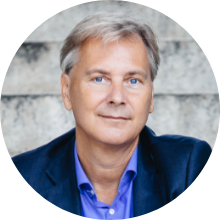Your medical career – Flying an F-16 jet plane
At our online video content platform, learning is crucial for success. Therefore, our mission is to provide you with the knowledge you need to become an ultrasound expert. However, we understand that medical knowledge and experience alone won't determine your success or happiness as a healthcare professional.
Throughout my career, I've had the privilege of mentoring and working alongside many individuals at different stages of their professional development. I've observed that talent and skill don't always guarantee success, and many healthcare professionals experience discontentment at some point in their careers.
I'm excited to share my experience, knowledge, and thoughts on career development in this newsletter series. These quick-read tips will inspire you to rethink your approach, develop a career strategy, and avoid common mistakes.
Life as a jet pilot
Some time ago, I reunited with a close friend from high school. Catching up with what life brought for both of us, my friend told me that his son was in the Israeli Air Force and that he was chosen as one of a few to fly an F-16 fighter jet plane.

Wow, how amazing! Indeed, an incredible accomplishment. And I was curious to learn more: Which stories can he tell? What is it like to fly such a sophisticated plane?
My friend smiled and said, "I can't tell you; my son does not talk about his job as a pilot, not even to me."
I was surprised: Wouldn't it be only natural to talk about your job, especially if you are among the elite of the elite?
My friend explained, "Pilots are not allowed to talk about their job, not only for security reasons. Pilots need to be self-reflected and modest. This is what makes good pilots. It is an important selection criterion as well."
When I thought about it, it made perfect sense to me. But do medical professionals act the same way? Like jet pilots, we also have a high reputation and considerable responsibility.
Down to earth
We all have experienced colleagues who brag about their achievements. How they can handle even the most difficult situations and solve a case no one else could solve. Frequently, they would indirectly put themselves on a pedestal by putting other colleagues down. I have always wondered where some of these colleagues get their confidence from. True, in some cases, they try to cover up insecurities. However, in most cases, they genuinely believe they are larger than life. Ultimately, they are also those who take the most significant risks.

What is at stake?
When you think of it, our power concerning the well-being and even the life or death of our patients is mind-blowing. But, at the same time, it also means we have a huge responsibility. A wrong decision, cut, or device setting can make a huge difference. But once you feel that you can master such a situation, you are at risk of developing overconfidence. This is a dangerous perception that can lead to catastrophic results. As a matter of fact, overconfidence is recognized as one of the primary reasons for medical errors.
The solution is "self-reflection."
Be aware that we all are at risk of an overconfidence bias. As the Nobel Prize winner Daniel Kahneman states in his groundbreaking book "Thinking Fast and Slow," overconfidence often occurs unconsciously. We must constantly remind ourselves that it exists to avoid falling into the overconfidence trap.
 Self-reflection protects against overconfidence.
Self-reflection protects against overconfidence.
Those who are more self-reflected are at lesser risk, while the inexperienced are often the most significant threat. Why? Because they are the ones that don't even know what they don't know.
The "disliked" colleague
But lack of self-reflection not only causes medical mistakes. Overconfident, arrogant, and conceited colleagues are usually poorly liked by co-workers, superiors, and patients. Consequently, such HCPs will find it challenging to build positive personal networks. Such networks are essential for your career. In my experience, this is one of the main reasons why even highly talented and skilled professionals often don't make it to the top. In my following newsletter, we will take a more detailed look at this topic and discuss why and how you can build a lasting network to help you in your career.
Sign up for our newsletter to receive more tips for rethinking your approach, developing a career strategy, and avoiding common mistakes!
Best,
Thomas Binder


